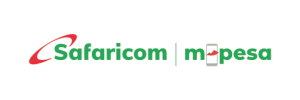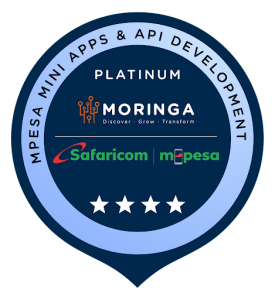Get Certified in M-PESA Mini Apps & API Development In as little as 21 Weeks

Introducing M-PESA Mini Apps & API Development Course, where innovation meets application!
This is a pioneering initiative designed for developers in collaboration with M-PESA Africa.
This pioneering course is designed for developers who want to advance their software development skills, particularly in functional and state (reactive) programming. Developed in collaboration with M-PESA Africa, this program goes beyond the basics to help you launch complementary web services called mini-applications, using lightweight front-end frameworks like XML.
Join us to explore the world of cross-platform super applications and emerge with a portfolio of front-end projects, showcasing your expertise in mini-applications development.
In partnership with;

New class dates will be communicated – Apply Here
The curriculum, developed in collaboration with M-PESA Africa and Moringa School, equates you with industry-ready skills. You’ll master API consumption, functional programming, and mini-app development. With guidance from certified technical mentors, you’ll be prepared to design, implement, and launch cross-platform services on both web and mobile platforms.
Your pathway to becoming an experienced Mini Applications Developer
This course covers all the aspects required to develop the technical skills and knowledge needed to become a mini-applications developer.
You will learn the essential technical skills needed to excel as a mini-applications developer. This includes mastering API design and testing, working with JavaScript frameworks like React, and implementing client-server relationships. You’ll build on this foundation by developing mini-applications with integrated payment solutions and deploying them across various platforms. Additionally, you’ll gain expertise in advanced React, Redux, and functional programming, as well as dive into XML technologies to create and style cross-platform services, understanding the core architecture of mini-apps. By the end of the course, you’ll be equipped to transition from a learner to a skilled mini-applications developer.
Students are required to commit at least 18 hours every week to learn. Lecture sessions take place between Mondays – Fridays between 6.00 pm – 9.00 pm. Additional hours and support will be availed on Saturdays upon request.
- Blended learning:- group work, self-learning, live classes, and project weeks.
- Learners are expected to use the weekend to work on their summative assessments, and projects ahead of deadlines
This course is ideal for tech enthusiasts at various stages of their careers, including:
- University/College graduates: Recent graduates from tech programs with foundational knowledge, looking to gain hands-on experience and advanced skills to transition into industry-ready professionals.
- Self-Taught Developers: Individuals who have taught themselves programming basics but have no formal work experience and are looking to validate and expand their skills.
- Career Switchers: Professionals from non-tech backgrounds who have some programming experience and want to deepen their technical expertise to move into tech careers.
- Junior Developers and IT professionals: Professionals with basic software development knowledge, aiming to refine their skills and move to mid-level roles.
- Moringa Alumni: Graduates with basic programming skills, eager to apply their knowledge in developing innovative app solutions.
- Tech Community Members: Active members of tech communities who wish to deepen their programming knowledge and contribute to real-world projects.
- Have basic computer skills.
- Proficiency in English – both spoken and written.
- Machine minimum specifications with Admin-permissions:
- 8GB RAM
- ~256GB HDD SSD
- Ubuntu or Mac (Special cases for Windows)
- Functional understanding of at least one operating system (Windows, macOS)for Linux users, they can use platforms like wine to leverage the Windows IDE.
- Students should be comfortable with JavaScript programming, including functions, objects, and data types; the basics of HTML & CSS; and the fundamentals of test-driven development.
- All classes are fully online. You are required to have access to a stable internet.
- Must have a desire and curiosity to learn.
- Availability to attend all classes.
This course has been designed in partnership with M-PESA Africa for beginners seeking to kickstart their software development career in Mini Applications. This is the first time the mini-apps certification is being introduced in the African market as a course on demand in collaboration with M-PESA Africa.
By the end of the program, students will have a portfolio showcasing front-end projects, illustrating their proficiency in mini-application development and the React JavaScript Framework through the delivery of a mini-application.
Moringa’s teaching model, the hands-on project-based approach ensures the students progressively build on each week’s knowledge in a simulated tech workplace environment.
Introduction to Front-End web development for cross-platform super applications.
Pioneering Mini-Apps Learning:
Explore groundbreaking mini-applications development, a first in Africa, in collaboration with M-PESA Africa, ensuring you stay at the forefront of industry trends.
Real-World Readiness:
Partnering with M-PESA Africa ensures a curriculum that aligns with industry needs, giving you practical insights and knowledge through access to industry-relevant labs and projects directly from the hiring partner.
Future-Ready Skills:
Gain insight into cross-platform super applications, positioning yourself for success with a unique blend of industry collaboration, practical & project-based learning experience, and forward-looking tech skills.
Career Opportunities:
A chance to work with M-PESA Africa in the future Mini Applications Projects
Certification:
A chance to get certified and get a Platinum Badge certification as a mini apps developer
Course Details
The curriculum has been designed by Moringa School in partnership with M-PESA Africa.
21 weeks
Part-Time Online Classes
Online Classes every Mon – Fri from 6.00 pm – 9.00 pm ( live lectures, self-learning, and Technical Mentor Support available)
KES 160,000
Installment plans are available on the installment plans document
N.B – The tuition & exam fees should be paid in full before the start of class. Download the fee payment plan for more details.
Ready to embark on your journey into mini-application development? – APPLY NOW

Curriculum Overview
APIs
- API Documentation and Keys best practices
- Postman
- Parsing JSON
- JavaScript API Calls
Asynchrony
- JavaScript functionality to handle asynchrony: callbacks, promises, and async functions.
- Working with Promises
- JavaScript error handling with try…catch.
- Error handling specifically for API calls
Functional Programming
- Pure functions
- Map, Reduce and Filter
- First class functions
- Higher order functions
- Immutability
JavaScript FP methods
- Closures
- Currying functions
- Recursion
- Composition over inheritance
- JavaScript methods commonly used for functional programming
Wellness Break
React
- Introduction to React [Framework]
- React Components
- Introduction to JSX
- Props, looping in JSX & Handling multimedia resources
- State: Introduction: Updating State with Events
React Principles
- Conditional rendering
- Callbacks: Passing Data
- Binding Functions
- JSX Expressions with Argument
- UI styling: React CSS Objects
REDUX
- Introduction: Redux
- Redux-React library
- Combining Reducers
- Redux Deployment
- Time Functions
- Component Lifecycle
Data Persistence
- Introduction to Hooks: Running and Refactor
- NoSQL: CAP Theory
- Client-Side Routing
- Firebase: Introduction
Firebase
- Authentication: Firebase
- Time Stamps Integration
- Hosting with Firebase
- Firestore || Structuring data
- Firestore Queries
Capstone Project
Wellness Break
Reactive API
- State Management in API calls
- API Testing
- Implementing Hooks
- Implementing Context & Provider
- Context Consumers and Error Handling
- Contextual Best Practices
Introduction to XML
- XML Technologies
- Describing Data with XML
- Types of XML Content || Syntax
- XML Namespaces
- XML and CSS Style
- Styling XML tags || Advanced CSS with XML
- Manipulating XML with DOM
- Discovering Document Content
- Creating Document Content
Introduction to Mini-Apps
- Introduction to mini-applications development IDE
- Mini Apps (Client-Server) Architecture
- Mini apps basic Architecture
- Mini app components and Building Blocks
Mini-application Development
- Event vs State system
- JSAPI – JS bridge guide for cross-app launch
- Event handling and debugging
- Resource management (ui, location, maps, media, alipay connect)
Mini-apps containers
- OpenAPI (Navigate to and back to Mini programs)
- Creating Mini apps Containers
- Managing Users
- Release and Deployment
- Push/publish mini apps to Sandbox
Integration
- File (File handling)
- Location (Location services)
- Network (Requests handling my.request)
- Device (Permissions, make Phone Call, Network Status)
Monitoring and Authentication
- Sockets Integration
- Back Office (Internal)
- Creation and updating of services
- Provisioning Mini apps services
- Project Ideation & Pitch
Portfolio Project
Ready to embark on your journey into mini-application development?

